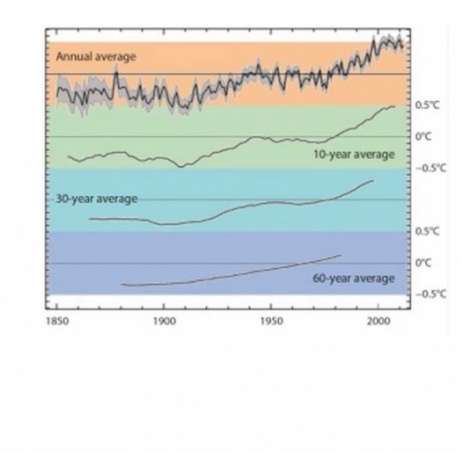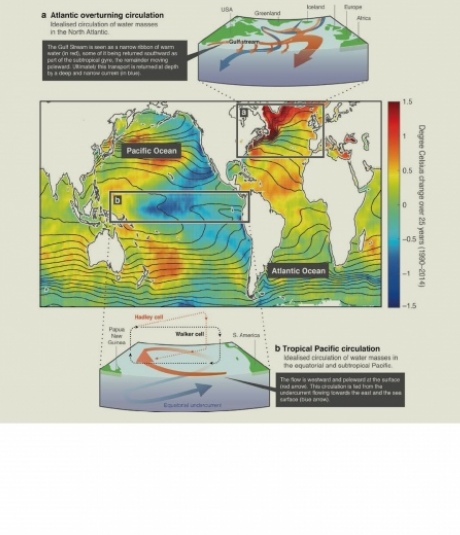Ocean currents may cause 'hiatus' in warming trends, but climate still changing
by Simon Levey

Average global temperatures have risen steadily since 1890, scientists are investigating why recent annual increases have been less dramatic.
According to the latest Intergovernmental Panel on Climate Change (IPCC) figures published in 2013, global surface temperatures increased by around 0.85°C between 1880 and 2012, and each of the last three decades has been warmer than the previous one.
Ocean circulation processes are just one of the factors that may have contributed to the hiatus, but they are clearly influencing the climate
– Dr Arnaud Czaja
Grantham Affiliate and Reader in the Department of Physics
However, while the average temperature increased by 0.12°C per decade since 1951, the surface of the planet only warmed by 0.05°C per decade between 1998 and 2012.
Imperial College London researchers presented the latest thinking about how strongly oceans influence regional climates - such as the Gulf Stream, which brings warm air to the UK and northern Europe - and why changes in the usual patterns of ocean currents could have unforeseen effects on the global climate.
They published their findings in a Grantham Institute briefing paper, which was launched today at a meeting of ocean modelling experts being held at Imperial.
The researchers say there is little reason to suspect that the impacts of climate change will be any less severe than previously thought because of this temporary change in the pace of warming.
Briefing paper co-author, Dr Arnaud Czaja, Grantham Affiliate and Reader in the Department of Physics at Imperial said: "Due to its large mass and ability to absorb thermal energy, the ocean has so far taken up most of the heat the Earth has acquired by global warming. We have yet to fully understand what the effect of this has been, or will be, on the climate. We are still discussing exactly how heat circulates in the ocean at scientific meetings such as today's at Imperial."
Whilst there is ongoing debate as to the severity of the hiatus, the research highlighted that a slowing or even a reversal of the upward trend in temperature is not unprecedented.

Figure: Average temperatures increase steadily over time, despite annual fluctuations (Source: Royal Society and National Academy of Sciences)
"Records show that the earth's surface temperatures have varied over timescales such as of years and decades, and so the observed slowdown of temperature rise does not substantially alter our understanding of the relationship between greenhouse gas emissions and surface temperature increase," said Dr Czaja.
Historic temperature records also show a variation over decades and a similar change of pace was observed between 1940 and 1975.
The amount of heat in the earth system as a whole has continued to increase since then, and over the last sixteen years, and climate change impacts not directly associated with global surface temperatures, including ice melt and sea level rise, have continued.
Leading hypotheses for the global warming hiatus, which may be confirmed by further research, include:
- A temporary dip in the ocean temperatures caused by stronger than usual Pacific trade winds;
- A slowing of the Atlantic Ocean currents that normally circulate warm water from the equator towards the cold North Pole.

Figure: Temperature changes in the oceans, and some of the key Pacific and Atlantic oceanic features involved in the recent hiatus. (Source: Grantham Institute)
Dr Czaja said: "It is likely that the rate of global surface temperature increase will continue to vary over timescales of years and decades.
"Ocean circulation processes are just one of the factors that may have contributed to the hiatus, but they are clearly influencing the climate and warrant more study."
The Grantham Institute briefing paper "Ocean heat uptake and the global surface temperature record" is an analysis of climate change and environmental research linked to work at Imperial, setting it in the context of national and international policy and the future research agenda.
This paper and other Grantham publications are available from www.imperial.ac.uk/grantham/publications
Article text (excluding photos or graphics) © Imperial College London.
Photos and graphics subject to third party copyright used with permission or © Imperial College London.
Reporter
Simon Levey
Communications Division